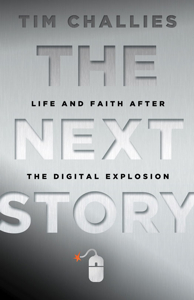Thank you to Zondervan Books for sending me a pre-release copy of the book to review!

The Next Story by Tim Challies is the first book about the digital age that I've ever read. There are other books and articles, some of which Challies references (Neil Postman’s Amusing Ourselves to Death, for instance), that I haven’t read, but really want to now because of The Next Story. The most interesting thing about this book, and why it makes me want to read some of the other works on the subject, is that it taps into cultural issues that affect the majority of people. I’ve been convinced that our digital devices are affecting us in certain ways, and I’ve observed some significant changes in myself since Apple products have become bigger parts of my life, and Challies does a decent job of bringing these things to light, exposing the ways digital technology is affecting our lives, and what we should think and do about it all. The benefits of “tech” are many, but so are the dangers.
Challies does a compelling job of tracing how our culture has drastically changed in the last century. He traces how technology has encroached more and more upon our personal and family lives, noting effects on us, both helpful and detrimental. The book keeps a decidedly biblical view of things, as Challies shows himself clearly thankful for the many benefits of iPhones, the internet, etc. But the negative effects of technology are also many, and as Challies says, “[w]e need to relearn how to think, and we need to discipline ourselves to think deeply, conquering the distractions in our lives so that we can live deeply” (117).
A central argument of the book is that this general distractedness, often standing in the way of deeper living, actually reflects greater root issues at play. Challies unpacks the now-popular hypothesis that “the medium is the message,” revealing that the mediums that convey information in our culture contain ideologies that affect us even more than the information itself. He says, “[w]e do not really understand American Idol until we understand how it has shaped us. We have not really understood a book until we’ve learned to recognize the ideologies buried deep within the words printed on paper and bound between two covers” (39). Challies shows us, with a convicting and critical voice, that texting and instant messaging, facebook statuses and twitter feeds, all aid in creating shorter attention spans, a disdain for any lengthy piece of writing, and ultimately a devaluing of real, face-to-face interaction between people, to name a few of the negative effects of “tech.”
The most valuable part of the book hits at the end, with Challies giving some very serious cautions we should keep in mind, especially for Christians who are called to engage with their culture while keeping themselves unstained from the world. So many of us remain unaware of the digital “trail” we leave behind us as we add to our Google search history, write blog posts and comment on others, “like” facebook updates from our smartphones, and enter personal information into digital forms. Challies cautions us to think very hard about living with integrity in the smallest areas of our lives, including our interactions in the digital world. And he urges us to try even harder to limit (if necessary) our digital interactions. There is freedom in this, he says, and that “when we know what is true, when we know what is true about our hearts and true about technology, we can be prepared to respond with wisdom and discernment so that we can live with true virtue in ... the aftermath of the digital explosion” (196).
Living with virtue is becoming more and more of a novel idea in our post-digital explosion culture. Many of us comment and share myriad ideas all over the internet, often without stopping to consider whether or not our comment conveys a greater message of integrity and holiness. We should pray hard that we engage the benefits and challenges of the digital age with all integrity. No comment made on the internet is, ultimately, insignificant – may we pray hard that we do everything with integrity and pursue that holiness, without which no one will see the Lord (Heb. 12:14).
All that to say, the book is definitely worth the read.
No comments:
Post a Comment